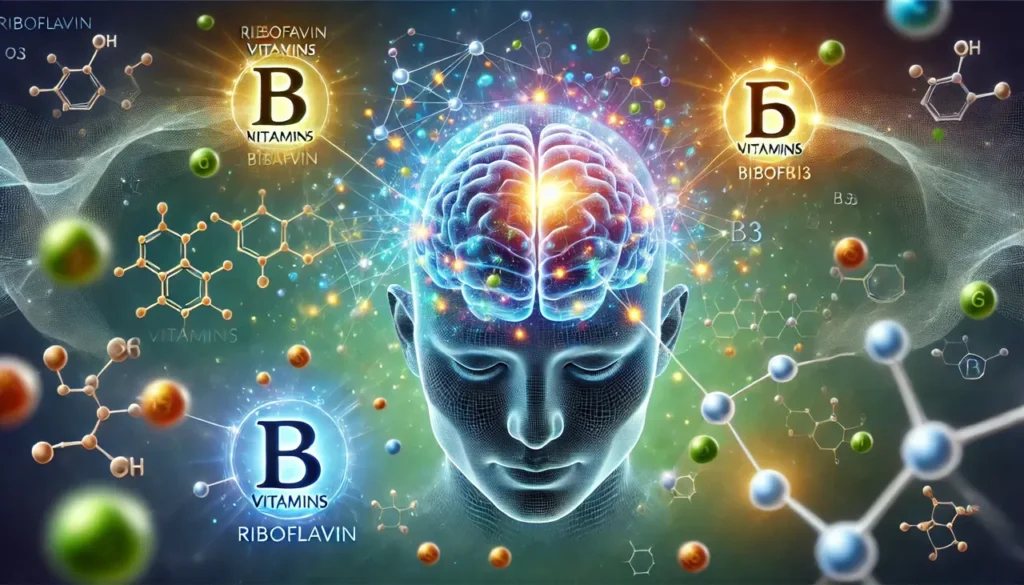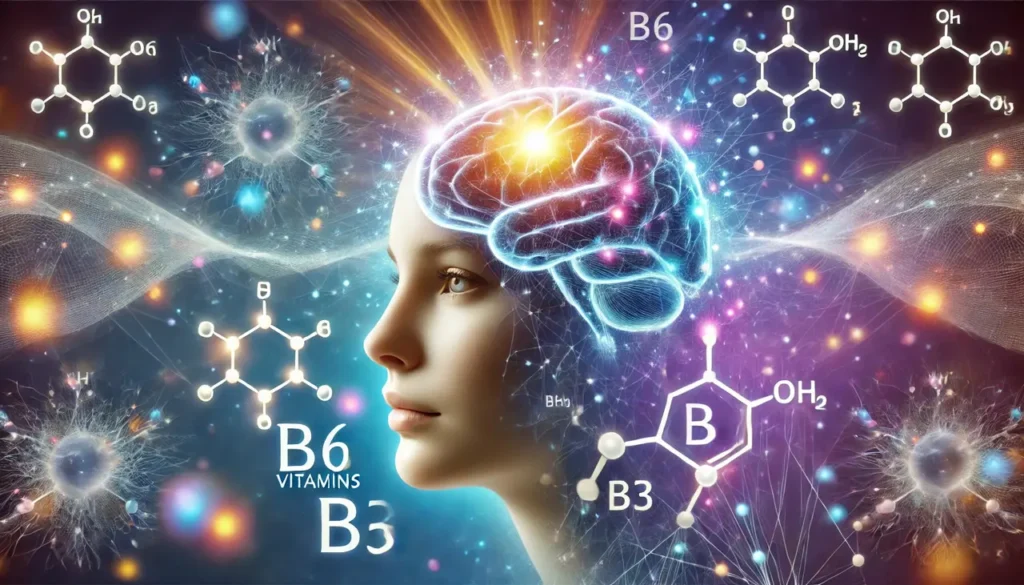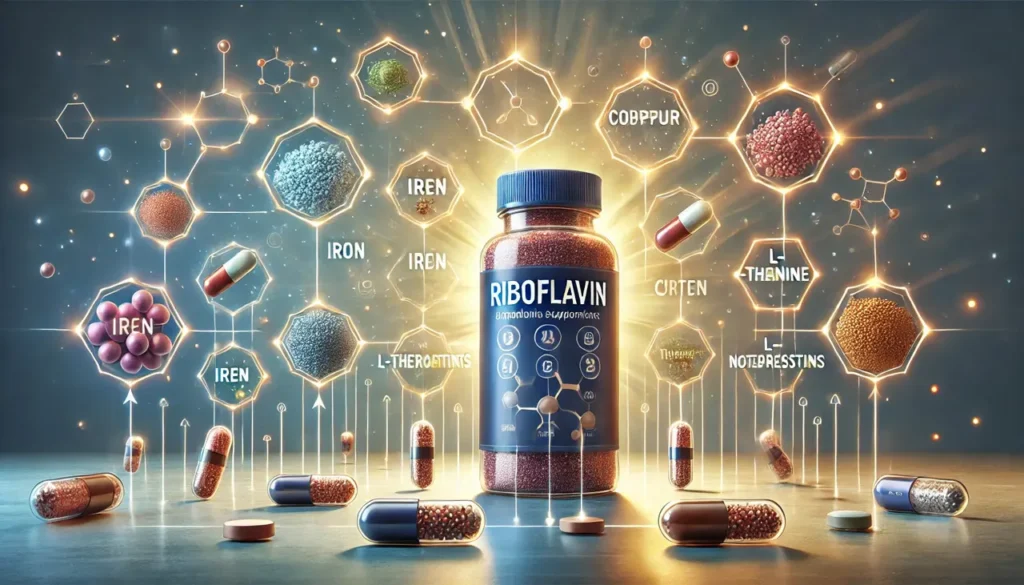Riboflavin, also known as vitamin B2, is an essential water-soluble vitamin that plays a critical role in maintaining optimal cellular function and metabolism. As part of the broader B-vitamin family, riboflavin is involved in numerous physiological processes, including energy production, redox reactions, and the maintenance of skin, eyes, and neurological health. Increasingly, riboflavin has drawn attention to its potential use as a nootropic supplement due to its impact on brain function and cognitive performance. This article provides an in-depth analysis of riboflavin, exploring its chemistry, physiological mechanisms, potential nootropic benefits, dosing guidelines, side effects, drug interactions, and other essential considerations for safe supplementation.
You May Also Like:
Sources of Riboflavin
Riboflavin is naturally found in a variety of food sources. Common sources include dairy products, eggs, lean meats, green leafy vegetables, and fortified grains. Other notable sources include:
- Animal-based foods: Beef liver, milk, eggs, and fish are rich in riboflavin.
- Plant-based foods: Spinach, almonds, and mushrooms provide significant amounts of this vitamin.
- Fortified foods: Many cereals and bread products are fortified with riboflavin to help ensure adequate intake, particularly for those on plant-based diets.
While many people can meet their daily riboflavin requirements through diet alone, individuals with specific health conditions or increased metabolic demands may benefit from supplementation.
Chemistry of Riboflavin
Riboflavin is composed of a flavin ring structure (isoalloxazine) connected to a ribitol sugar. It acts as a precursor to two key coenzymes: flavin mononucleotide (FMN) and flavin adenine dinucleotide (FAD). These coenzymes are essential for various oxidation-reduction (redox) reactions in the body, helping convert nutrients into usable cellular energy. Riboflavin’s redox activity is particularly important in mitochondrial function, where it facilitates the production of ATP (adenosine triphosphate), the primary energy currency of cells.
Additionally, riboflavin supports the body’s antioxidant systems by maintaining the reduced form of glutathione, a key antioxidant that helps protect cells—particularly brain cells—from oxidative stress. This role is crucial for cognitive health, as oxidative damage can contribute to neurodegenerative diseases and cognitive decline.
Physiological Mechanisms of Riboflavin in the Body and Brain
Riboflavin’s primary role in the body is its involvement in the production of ATP (adenosine triphosphate), the energy currency of the cell. The vitamin is integral to the mitochondrial electron transport chain, where it facilitates the transfer of electrons from nutrients to oxygen, ultimately producing energy. This energy is critical for sustaining cellular functions, particularly in tissues with high metabolic rates, such as the brain.
Beyond its role in energy metabolism, riboflavin acts as an antioxidant. Through its involvement in the glutathione redox cycle, riboflavin helps neutralize reactive oxygen species (ROS), protecting cells from oxidative damage. This antioxidative capacity is particularly relevant in the brain, where high oxygen consumption makes neural tissues vulnerable to oxidative stress. Riboflavin, therefore, plays a neuroprotective role by limiting oxidative damage that may lead to cognitive decline or neurodegenerative conditions such as Alzheimer’s disease.
Riboflavin also metabolizes other B vitamins, including vitamins B6 and niacin (B3). These interactions support neurotransmitter synthesis, which is essential for mood regulation, memory, and overall cognitive function. Given its contribution to these fundamental processes, riboflavin is being explored as a nootropic supplement to enhance brain health.

Nootropic Benefits of Riboflavin
The concept of using riboflavin as a nootropic—substances that improve cognitive function—stems from its ability to support brain metabolism, antioxidant defense, and neurotransmitter synthesis. Although more commonly recognized for its essential nutrient status, riboflavin may have specific cognitive benefits worth exploring.
- Enhanced Energy Metabolism in the Brain: Riboflavin’s central role in mitochondrial ATP production is particularly relevant for brain cells, which have high energy demands. By ensuring a steady supply of energy, riboflavin helps maintain neuronal function, which is crucial for memory, learning, and focus. This is particularly important under conditions of metabolic stress, such as mental fatigue, where riboflavin may provide a cognitive boost.
- Antioxidant and Neuroprotective Effects: The brain is highly susceptible to oxidative stress, which can lead to neurodegenerative diseases and cognitive decline. Riboflavin’s participation in the regeneration of glutathione, one of the body’s primary antioxidants, enables it to reduce oxidative damage in neurons. Studies suggest that riboflavin may slow the progression of certain neurodegenerative diseases, such as Parkinson’s and Alzheimer’s, due to its neuroprotective properties.
- Migraine Prevention and Cognitive Clarity: Riboflavin has been studied for its efficacy in preventing migraines, which are often accompanied by cognitive disturbances such as brain fog and poor concentration. Research shows that high doses of riboflavin (400 mg per day) can significantly reduce the frequency and severity of migraines, likely due to its role in mitochondrial energy production in the brain. By improving mitochondrial function, riboflavin may also enhance mental clarity in individuals prone to cognitive impairment during migraine attacks.
- Mood Regulation and Cognitive Performance: Riboflavin, through its involvement in the synthesis of neurotransmitters like serotonin and dopamine, may help regulate mood and mental sharpness. While it is not a primary treatment for mood disorders, adequate riboflavin intake supports the function of other B vitamins, like B6 and B12, which are directly involved in neurotransmitter production. This synergy may improve cognitive performance, particularly in individuals with mild deficiencies.

Dosage and Supplementation Guidelines
For general health, the recommended daily allowance (RDA) for riboflavin is 1.3 mg for adult men and 1.1 mg for adult women, with slightly higher requirements for pregnant and breastfeeding women. These levels are easily attainable through a balanced diet. However, for therapeutic or nootropic purposes, higher doses may be considered.
- General Nootropic Dosage: For cognitive enhancement, doses between 10 and 50 mg per day may provide sufficient support for brain health without exceeding safety limits. Riboflavin is available in multivitamins and as a standalone supplement, often in dosages ranging from 25 to 100 mg.
- Migraine Prevention Dosage: Clinical studies investigating riboflavin for migraine prevention typically use a dosage of 400 mg per day. This is significantly higher than the RDA but has been shown to be safe for most individuals under medical supervision.
- Supplement Forms: Riboflavin supplements are available in various forms, including tablets, capsules, and liquid drops. Some individuals may opt for riboflavin as part of a B-complex supplement, which combines it with other B vitamins for comprehensive support.
It is important to note that riboflavin is a water-soluble vitamin, meaning excess amounts are excreted through urine rather than stored in the body. While this reduces the risk of toxicity, very high doses may lead to bright yellow urine, which is a harmless but noticeable side effect.
Side Effects and Safety
Riboflavin is generally considered safe, even at higher doses. However, some individuals may experience mild side effects, particularly when taking doses significantly above the RDA. These side effects include:
- Yellow Discoloration of Urine: A harmless but common side effect of riboflavin supplementation is the bright yellow color it imparts to urine. This is due to the body’s excretion of excess riboflavin.
- Digestive Disturbances: Some people may experience nausea, diarrhea, or abdominal discomfort when taking high doses of riboflavin, especially in large tablets.
- Allergic Reactions: Though rare, allergic reactions to riboflavin supplements can occur, manifesting as rashes, itching, or swelling. Individuals with known sensitivities should consult a healthcare provider before starting supplementation.
Interactions with Other Supplements and Medications
Riboflavin interacts with several medications and supplements, potentially altering their efficacy or causing adverse effects. It is essential to understand these interactions to prevent complications.
- Antidepressants and Antipsychotics: Some medications, such as tricyclic antidepressants and antipsychotic drugs, can reduce riboflavin levels in the body. In these cases, riboflavin supplementation may be beneficial in counteracting the deficiency and maintaining optimal brain function.
- Birth Control Pills: Women taking oral contraceptives may have lower riboflavin levels, as estrogen can reduce the vitamin’s absorption and increase its excretion. Riboflavin supplementation may be helpful for women on birth control to prevent deficiencies that could impact cognitive health.
- Cancer Treatments: Certain chemotherapy drugs may interfere with riboflavin metabolism, affecting the vitamin’s availability in the body. However, there is conflicting evidence on whether riboflavin supplementation during chemotherapy is beneficial or harmful. Patients undergoing cancer treatment should consult their oncologist before taking riboflavin supplements.
- Iron and Copper Supplements: to absorb and metabolize iron and copper properly. While this interaction is generally beneficial, excessive iron or copper supplementation can deplete riboflavin levels, necessitating a balanced intake of these nutrients.
- Nootropics: Riboflavin can be safely combined with other nootropics, such as caffeine or L-theanine, to enhance cognitive function. However, individuals taking racetams or cholinergic nootropics should monitor their riboflavin intake, as excessive B2 may overstimulate energy metabolism and lead to headaches or nervousness.

Risks for Individuals with Certain Health Conditions
While riboflavin is safe for most individuals, certain health conditions may warrant caution when using this supplement.
- Kidney Disease: Individuals with kidney disease should be cautious about high doses of riboflavin, as the kidneys are responsible for excreting excess amounts. In severe cases, impaired kidney function could lead to riboflavin buildup and exacerbate symptoms.
- Liver Disease: Riboflavin metabolism occurs in the liver, and individuals with liver disease may have altered riboflavin processing. While moderate riboflavin intake is generally safe, high doses should be avoided unless monitored by a healthcare provider.
Conclusion: Should You Consider Riboflavin as a Nootropic?
Riboflavin’s role in energy metabolism, antioxidant defense, and neurotransmitter synthesis makes it a promising candidate for supporting cognitive function. Whether you’re seeking to enhance mental clarity, prevent migraines, or protect against age-related cognitive decline, riboflavin supplementation offers a range of potential benefits. However, the current research on riboflavin as a nootropic is still in its early stages, and more studies are needed to confirm its efficacy for cognitive enhancement.
As with any supplement, it is important to consult with a healthcare professional before beginning riboflavin supplementation, particularly if you have pre-existing health conditions or are taking medications that may interact with this vitamin. In summary, riboflavin is a versatile and essential nutrient supporting general health and cognitive function. By maintaining adequate riboflavin levels through diet or supplementation, individuals can optimize brain energy, protect against oxidative stress, and promote overall mental well-being.

References:
- Riboflavin (Vitamin B2): Everything You Should Know. Retrieved from: https://www.verywellhealth.com/riboflavin-benefits-deficiency-and-more-7508278
- Benefits and sources of vitamin B2. Retrieved from: https://www.medicalnewstoday.com/articles/219561
- 4 Health Benefits of Riboflavin (Vitamin B2). Retrieved from: https://health.clevelandclinic.org/vitamin-b2
- Riboflavin: The Health Benefits of a Forgotten Natural Vitamin. Retrieved from: https://pmc.ncbi.nlm.nih.gov/articles/PMC7037471/
Important Note: The information contained in this article is for general informational purposes only, and should not be construed as health or medical advice, nor is it intended to diagnose, prevent, treat, or cure any disease or health condition. Before embarking on any diet, fitness regimen, or program of nutritional supplementation, it is advisable to consult your healthcare professional in order to determine its safety and probable efficacy in terms of your individual state of health.
Regarding Nutritional Supplements Or Other Non-Prescription Health Products: If any nutritional supplements or other non-prescription health products are mentioned in the foregoing article, any claims or statements made about them have not been evaluated by the U.S. Food and Drug Administration, and such nutritional supplements or other health products are not intended to diagnose, treat, cure, or prevent any disease.


